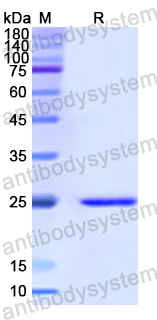Catalog No.
YHH13401
Expression system
E. coli
Species
Homo sapiens (Human)
Protein length
Gly423-Leu632
Predicted molecular weight
25.40 kDa
Nature
Recombinant
Endotoxin level
Please contact with the lab for this information.
Purity
>90% as determined by SDS-PAGE.
Accession
Q15582
Applications
ELISA, Immunogen, SDS-PAGE, WB, Bioactivity testing in progress
Form
Lyophilized
Storage buffer
Lyophilized from a solution in PBS pH 7.4, 0.02% NLS, 1mM EDTA, 4% Trehalose, 1% Mannitol.
Reconstitution
Reconstitute in sterile water for a stock solution. A copy of datasheet will be provided with the products, please refer to it for details.
Shipping
In general, proteins are provided as lyophilized powder/frozen liquid. They are shipped out with dry ice/blue ice unless customers require otherwise.
Stability and Storage
Use a manual defrost freezer and avoid repeated freeze thaw cycles. Store at 2 to 8°C for frequent use. Store at -20 to -80°C for twelve months from the date of receipt.
Alternative Names
RGD-containing collagen-associated protein, Beta ig-h3, Transforming growth factor-beta-induced protein ig-h3, RGD-CAP, BIGH3, TGFBI, Kerato-epithelin
Proteolytic degradation of Beta-Ig H3 (βigH3/TGFBI) can be quantified non-invasively in serum and predicts prognosis in patients with advanced pancreatic ductal adenocarcinoma., PMID:40394523
TGFBI promotes EMT and perineural invasion of pancreatic cancer via PI3K/AKT pathway., PMID:40286004
TGFBI R124H mutant allele silencing in granular corneal dystrophy type 2 using topical siRNA delivery., PMID:40185334
Correction: Han et al. Genotypic Homogeneity in Distinctive Transforming Growth Factor-Beta-Induced (TGFBI) Protein Phenotypes. Int. J. Mol. Sci. 2021, 22, 1230., PMID:40077002
Clinical and Structural Characterization of a Novel TGFBI Mutation Linked to a Lattice Corneal Dystrophy Variant in a Greek Family., PMID:40049267
Molecular genetic analysis of R124H TGFBIp in one family Avellino corneal dystrophy., PMID:39959167
TGFBI regulates pulmonary vascular remodeling through endothelial-to-mesenchymal transition in pulmonary arterial hypertension., PMID:39908906
Compound Heterozygous p.(R124C) (Classic Lattice Corneal Dystrophy) and p.(R124H) (Granular Corneal Dystrophy Type 2) in TGFBI: Phenotype, Genotype, and Treatment., PMID:39858623
Hypoxic conditions affect transcriptome of endometrial stromal cells in endometriosis and promote TGFBI axis., PMID:39744178
Unilateral lattice corneal dystrophy with c.1501C>A (p.P501T) and c.1733T>C (p.L578P) variants in the transforming growth factor-beta induced gene: a case report., PMID:39618086
Hypoxia-induced TGFBI maintains glioma stem cells by stabilizing EphA2., PMID:39346536
BIGH3 mediates apoptosis and gap junction failure in osteocytes during renal cell carcinoma bone metastasis progression., PMID:38849015
Ophthalmic drug effects on the amyloidogenesis of a transforming growth factor β-induced protein (TGFBIp) peptide fragment., PMID:38762008
Distribution of TGFBI variants in patients with early onset glaucoma., PMID:38577561
Novel prognostic marker TGFBI affects the migration and invasion function of ovarian cancer cells and activates the integrin αvβ3-PI3K-Akt signaling pathway., PMID:38395907
HIF-2α-dependent TGFBI promotes ovarian cancer chemoresistance by activating PI3K/Akt pathway to inhibit apoptosis and facilitate DNA repair process., PMID:38365849
Cathepsin D promotes polarization of tumor-associated macrophages and metastasis through TGFBI-CCL20 signaling., PMID:38297161
Mimicking TGFBI Hot-Spot Mutation Did Not Result in Any Deposit Formation in the Zebrafish Cornea., PMID:38164916
FN1 and TGFBI are key biomarkers of macrophage immune injury in diabetic kidney disease., PMID:37960829
A novel role of TGFBI in macrophage polarization and macrophage-induced pancreatic cancer growth and therapeutic resistance., PMID:37865162
The TGFBI gene and protein expression in topotecan resistant ovarian cancer cell lines., PMID:37806183
Type II Diabetes Mellitus Causes Extracellular Matrix Alterations in the Posterior Cornea That Increase Graft Thickness and Rigidity., PMID:37326594
TGFBI as a candidate biomarker for non-invasive diagnosis of early-stage endometriosis., PMID:37187159
Clinical and Histopathologic Characteristics and Template of the TGFBI p.(His626Arg) Missense Variant Lattice Corneal Dystrophy., PMID:36796020
Expression of TGFBI in infantile hemangioma tissues and its effect on the biological characteristics of hemangioma endothelial cells., PMID:38596938
Hub gene target of glioblastoma: LOX, SERPINH1 and TGFBI., PMID:36397358
Transforming growth factor-β induced protein regulates pulmonary fibrosis via the G-protein signaling modulator 2 /Snail axis., PMID:35872259
Human platelets release TGFBIp in acute myocardial infarction., PMID:35545686
Genetic screening of TGFBI in Iranian patients with TGFBI-associated corneal dystrophies and a meta-analysis of global variation frequencies., PMID:35473478
Soluble TGFBI aggravates the malignancy of cholangiocarcinoma through activation of the ITGB1 dependent PPARγ signalling pathway., PMID:35357655
Confirmation of association of TGFBI p.Ser591Phe mutation with variant lattice corneal dystrophy., PMID:35315300
Integrated bioinformatics analysis identifies established and novel TGFβ1-regulated genes modulated by anti-fibrotic drugs., PMID:35197532
MiR-766-3p Suppresses Malignant Behaviors and Stimulates Apoptosis of Colon Cancer Cells via Targeting TGFBI., PMID:35083181
Niclosamide Suppresses Migration and Invasion of Human Osteosarcoma Cells by Repressing TGFBI Expression via the ERK Signaling Pathway., PMID:35008910
Mutation effects on FAS1 domain 4 based on structure and solubility., PMID:34942360
An Arg124Cys mutation in transforming growth factor β-induced gene associated with lattice corneal dystrophy type I in a Chinese pedigree., PMID:34937214
Cancer-associated MSC drive tumor immune exclusion and resistance to immunotherapy, which can be overcome by Hedgehog inhibition., PMID:34767446
Proteomic analysis of peritoneal fluid identified COMP and TGFBI as new candidate biomarkers for endometriosis., PMID:34686725
Pan-Cancer Analysis of the Associations of TGFBI Expression With Prognosis and Immune Characteristics., PMID:34671645
Immobilization of Jagged1 Enhances Vascular Smooth Muscle Cells Maturation by Activating the Notch Pathway., PMID:34440858
Torin 1 alleviates impairment of TFEB-mediated lysosomal biogenesis and autophagy in TGFBI (p.G623_H626del)-linked Thiel-Behnke corneal dystrophy., PMID:34403298
Ocular Involvement in Hereditary Amyloidosis., PMID:34206500
The potential renal toxicity of silver nanoparticles after repeated oral exposure and its underlying mechanisms., PMID:34144690
Cyclooxygenase (COX)-2 modulates Toxoplasma gondii infection, immune response and lipid droplets formation in human trophoblast cells and villous explants., PMID:34135407
Mutation-induced dimerization of transforming growth factor-β-induced protein may drive protein aggregation in granular corneal dystrophy., PMID:34097874
Prevalence of granular corneal dystrophy type 2-related TGFBI p.R124H variant in a South Korean population., PMID:34012230
TGFBI is involved in the formation of polyploid cancer cells and the response to paclitaxel., PMID:33987391
Endothelial angiogenic activity and adipose angiogenesis is controlled by extracellular matrix protein TGFBI., PMID:33958649
Piperine Targets Different Drug Resistance Mechanisms in Human Ovarian Cancer Cell Lines Leading to Increased Sensitivity to Cytotoxic Drugs., PMID:33921897
Compound heterozygous mutations in TGFBI cause a severe phenotype of granular corneal dystrophy type 2., PMID:33772078

